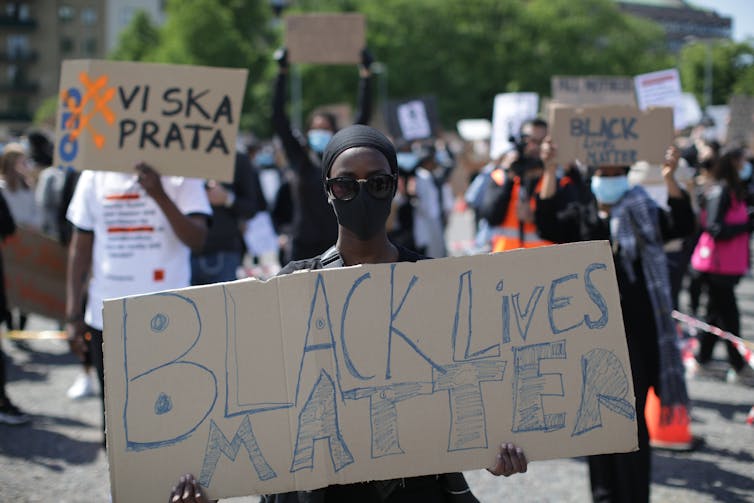Will European countries ever take meaningful steps to end colonial legacies?
Visiting Researcher at the Raoul Wallenberg Institute of Human Rights and Humanitarian Law, Lund University
Centuries of European colonialism have had a tremendous impact on shaping inequities within and among countries, many of which are yet to be effectively addressed. This may seem like a trivial statement, but it is only recently being recognised by EU countries.
In 2019, the European Parliament passed a Resolution on the Fundamental Rights of People of African Descent. It called for a comprehensive perspective on colonialism and slavery, which recognises their historical and contemporary adverse effects on people of African descent.
Similarly, last year’s ambitious anti-racism action plan for 2020-2025 declares that colonialism is embedded in European history and has profound consequences for society today.
Still, the EU has some way to go to fully recognise, let alone address, the structural legacies of colonialism – for example, the racial dividing lines between white people and people of colour within the EU. In all major areas of society across the EU, people of colour tend to be the most discriminated against. Yet, speaking of race and differences between white people and people of colour is not part of the political and legal discourse in the EU.
Sweden as a case study
Regarding Europe’s dawning recognition of colonial legacies, Sweden is a case in point. After the second world war it projected itself as a “moral superpower” without any of its own issues with colonialism and racism. It was a champion for equal rights, global justice and solidarity.
From the early 1960s, it stood up against colonialism at the UN and actively supported anti-colonial struggles. It funded the ANC in South Africa.
Today, Sweden remains among the world’s largest donors of development aid, despite being a relatively small country. Until recently, Sweden had the most generous admission of refugees per capita in Europe. If we are to believe the Good Country Index, there is no country in the world that contributes more to the common good of humanity than Sweden.
But Sweden has always participated in, benefited from and even contributed to the international racial divisions of colonialism. Between the first and second world wars, the Swedish parliament voted for the establishment of a state institute for studying, promoting and conserving the race biology of the nation. The commonplace conception at the time was that ethnic Swedes belonged to a superior Nordic type of white Europeans.
Nor was Sweden a mere bystander to the racial ordering of world affairs that began with European expansion during the late 15th century. It participated in the scramble for overseas colonies, holding onto the island of St Barthélemy in the Caribbean, for nearly a century. This became a significant free port where the treatment of enslaved Africans was no different than on neighbouring islands.
Today, people of non-European descent make up roughly 15-20% of the Swedish population, a segment of society that has much higher levels of unemployment than white Swedes. While the employment rate for native-born Swedes is close to 100%, for those born in Asia and Africa it is 55-60%.

The more educated you are as an African Swede, the larger the pay gap when set against other Swedes with the same educational attributes – and the more difficult it is to find a job that matches your qualifications. Native-born African Swedes with a university education make approximately 49% less than the rest of the population with similar qualifications.
These hierarchies in Swedish society are part of a global pattern that has come about as a result of a shared colonial history.
Addressing colonial legacies
Despite efforts in some respects, Sweden and other European countries do not properly recognise the many global inequities that are the legacy of colonialism. As the United Nations secretary-general, António Guterres, put it, colonialism still reverberates in social injustices, the global economy and international power relations.
Former colonial powers are refusing to give up their domination at the UN, World Bank and International Monetary Fund, for example. Many European nations have consistently opposed and ignored UN resolutions passed with overwhelming majority by the UN General Assembly and Human Rights Council calling for a democratic and equitable international order.
This year marks the 20th anniversary of the World Conference Against Racism in South Africa and the world’s most comprehensive human rights instrument against racial discrimination. Among other things, this Durban Declaration and Programme of Action calls for an end to the racial structures established by colonialism and for concerned states to halt and reverse the lasting consequences of the transatlantic slave trade.
The UK, France and other European countries have opposed the implementation of the Durban Declaration – and Sweden has supported them. For example, on New Year’s Eve 2020 the UN General Assembly passed a resolution for a comprehensive implementation of the declaration, also endorsing the decision to establish a UN permanent forum on people of African descent. When put to a vote, 106 countries supported the resolution. Only 14 voted against – among them the UK, France and the Netherlands. Another 44 abstained, including Sweden.
Still, EU countries seem to be slowly coming around to recognising the global impact of colonialism. In December 2020, the European Parliament held an inaugural European Day for the Abolition of the Slave Trade. In Sweden, a government agency is making efforts towards raising public awareness of Sweden’s participation in the racialised order of European colonialism. That includes its colonisation of Europe’s only recognised indigenous peoples, the Saami.
So far, no steps have been taken towards redress, but maybe we are witnessing the beginning of an honest reckoning of the past and its impacts on the present.
https://theconversation.com/will-european-countries-ever-take-meaningful-steps-to-end-colonial-legacies-148581

0 Comments:
Post a Comment
Subscribe to Post Comments [Atom]
<< Home